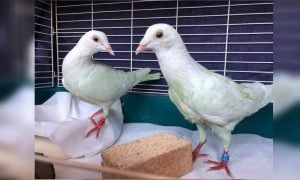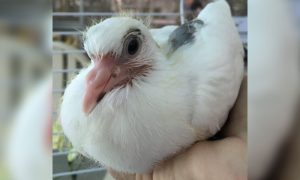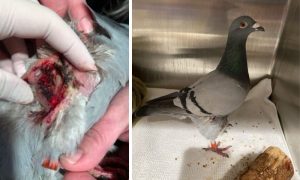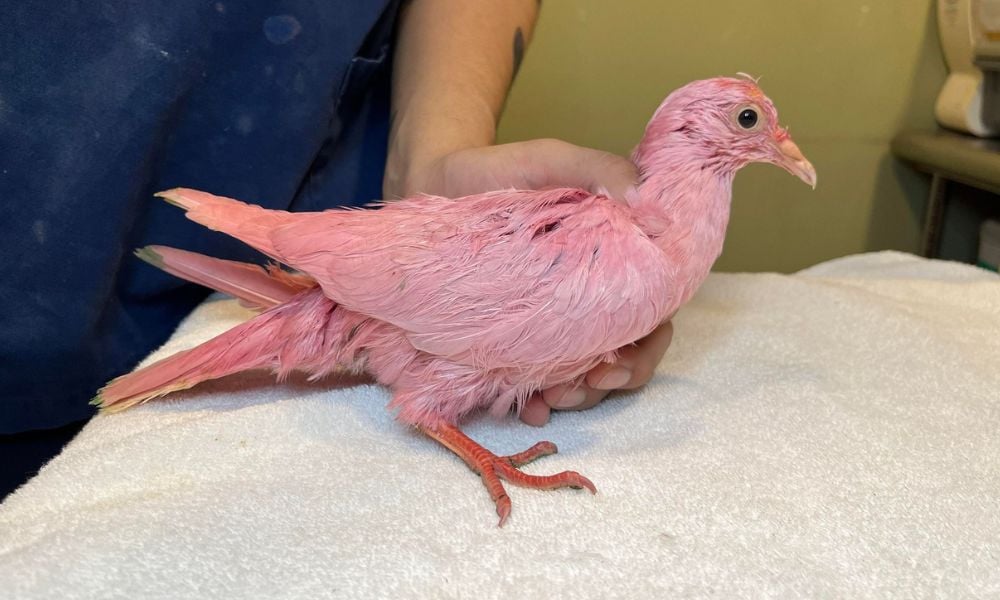The world has long had a fascination with doves — beautiful, gentle, iconic animals people have come to associate with peace and compassion.
But their gentle natures in particular are what make these precious birds and king pigeons — their look-alikes — vulnerable to exploitation, injury, and death in acts for people’s “entertainment.”
Here’s a list of five featured acts you should avoid if you don’t want to contribute to the cruelty.
1.Don’t Dye Birds — They Will Suffer and Can Die.
When a hot pink king pigeon surfaced in Madison Square Park in Manhattan, passersby knew the bird’s condition wasn’t natural — and public outrage was intense.
The Wild Bird Fund, a nonprofit specializing in wild bird rehabilitation that also saved 55 domestic king pigeons last year, took in the sick and starving domestic bird and named him Flamingo. They administered heat, oxygen, medication, and subcutaneous fluids and attempted via several baths to remove the hair dye that was creating an inescapable, toxic cloud of smell around the distressed and weak Flamingo.
But the bird remained weak and was struggling to keep down food, the nonprofit Tweeted after intake.
“One problem is that the dye has a strong odor, and we’re concerned for the bird’s respiratory health,” Wild Bird Fund wrote. “Birds are sensitive to certain fumes, and this one is essentially living inside a cloud. We’re also concerned about him ingesting the chemical through preening.”
Despite the caring and dedicated efforts of rehabilitators, Flamingo died a few days later — likely from inhaling toxins in the dye, the New York Times reported.
We are deeply sad to report that Flamingo, our sweet pink pigeon, has passed away. Despite our best efforts to reduce the fumes coming off the dye, while keeping him calm and stable, he died in the night. We believe his death was caused by inhaling the toxins.
📷: Alexis Ayala pic.twitter.com/218hh6oN8P
— Wild Bird Fund (@wildbirdfund) February 7, 2023
“We don’t know why this bird was dyed or released,” Wild Bird Fund told LFT. “Many of our followers guessed gender reveal, but it could have been another kind of ceremony, an art stint, we don’t know. The bottom line: Don’t harm animals for any of these reasons.”
Palomacy, a California-based nonprofit devoted solely to the rescue, rehabilitation, and rehoming of unreleasable pigeons and doves, said they also have taken in defenseless birds who had been cruelly and unnaturally dyed.
Three of those birds were Jake, Rosie, and Nessie, who were dropped off at a local humane society and were sick, underweight, and dyed green. Palomacy stepped in and rescued them. Later, Palomacy adopter Sindy Harris fell in love with the birds and adopted Rose and Jake, who are now living their best life.
Harris told Lady Freethinker the prevailing theory is that the defenseless birds were dyed for a wedding.
“Apparently, the couple wanted the pigeons dyed to match the color of their wedding scheme,” she said. “In any event, Jake and Rosie are both permanently (and totally) blind from the dye.”

Rose and Jake (Photo Courtesy of Palomacy)
2. Cut Cruelty From Ceremonies — Don’t Release “Doves.”
In addition to never being dyed, domestic birds should never be released, The Wild Bird Fund added.
Flamingo, a juvenile king pigeon or “squab” probably sold at a local poultry live market, likely had never flown before, had no survival skills, and likely would have starved to death even had he not been dyed, the nonprofit said.
The Wild Bird Fund added that the release of doves or pigeons “is probably the most common problem we encounter in the area of exploitation” and encouraged people to “Please never release domestic birds to the wild. Not for weddings, funerals, celebrations, art projects, anything.”
“Dove releases sound romantic, but take away the decorations and Instagram photos, and they are the equivalent of dumping your helpless pets on the side of the road,” the nonprofit said via social media. “This is no way to celebrate anything.”
Elizabeth Young, Palomacy’s founder, emphasized to LFT that pigeons are incredibly intelligent animals who have unique personalities, mate for life, remember people’s faces, and bond with their caretakers. They’re far from “stupid.”
But because domestic pigeons have typically been bred and raised for people’s “food,” they don’t have wild bird survival instincts. Even pigeons bred to have sharper homing instincts for the “dove release” business often get hurt, she added.
“Even under the best circumstances, trained ‘wedding doves’ are hurt, lost, and killed trying to get home,” Palomacy wrote in an online post. “It’s even worse when do-it-yourselfers mistakenly buy white ring-necked doves and king pigeons to release. Nearly all of them will die.”
Palomacy’s website points to numerous examples from the news — including a memorial service where released pigeons purchased last-minute from a poultry market plunged to their deaths in the Hudson River or fatally collided with glass windows and a pair of doves released by the Vatican as a symbol of “peace” who were immediately attacked by a seagull and a crow.
Palomacy took in more than 300 rescued pigeons and doves in 2021 alone — the vast majority of whom likely were either released during ceremonies or purchased from poultry markets and “mercy released” by people who mistakenly thought the birds would survive, Young said.
Another layer of cruelty is that breeders often kill any baby birds who aren’t born the Instagrammable white.
In a guest post for Palomacy, the founder of a former pigeon breeding and “release” business described her shock when she asked her network what she should do about a tiny bird, born with salt and pepper markings.
“I was told ways of killing this bird including snapping his neck or smothering him in a plastic bag with alcohol,” she wrote.

Johnny, a pigeon likely dumped because of his coloring (Photo Courtesy of Palomacy)
3. Avoid Magic Shows With Live Birds — They Really Do “Disappear.”
Black-suited magicians are famous for a number of live bird “tricks” — from pulling live doves or white pigeons seemingly from behind people’s ears to making canaries “disappear” from collapsing cages before they reappear somewhere else, seemingly unharmed.
The reality is that the birds in magic acts often suffer and die.
Beauty Without Cruelty-India noted that birds in magic shows often have to travel long distances, which can be stressful, and that the key to all tricks is to “practice, practice, practice.” If delicate, sensitive birds are injured or die along the way, they’re simply “discarded and new ones take their place,” the charitable trust wrote in an online post.
In addition to being treated as disposable, magic show birds suffer, with welfare groups reporting gentle doves can be stuck to the inside of magicians’ sleeves with double-sided tape, suffocated from being confined in small spaces for too long, or singed if the show includes special effects like flares.
Canaries in “collapsing cage” acts notoriously involve two birds — one who is crushed to death when the cage collapses, and a second one who is released somewhere else, giving the appearance that the bird “escaped,” according to multiple groups and magicians who said they will never use live animals in their acts.
Palomacy is among the pigeon advocates who will tell you that birds and magic should never mix.
“We’ve taken in magicians’ doves that they kept, trained and used, hidden in their sleeves or cupped in their palms,” she said. “One magician did a show at a library, and the bird got away. He just left it. We took that bird in.”
4. Don’t Bet On It: “Raced” Pigeons Often Don’t Make It Home.
Lilo, a gorgeous pigeon, found his way to Palomacy badly wounded following a hawk attack.
The emaciated bird was hospitalized for 11 days, with vet bills totaling more than $2,100, and a band on his leg showing that he was used in pigeon racing, Palomacy said.
In pigeon racing, banded birds often are trucked hundreds of miles away from their homes and then unleashed en masse. The birds who successfully — and most quickly — make it back to their breeders “win.”
Young said that far fewer people are aware of pigeon racing than dove releases.
“It’s all pride and gambling,” Young said. “They breed up these domestic racing pigeons, skilled in homing instincts, and they’re merciless along the way. If a baby in the nest is wonky, they’ll kill them.”
Young said it’s not uncommon for as many as half of the birds to die en route, with others arriving back at the facilities having burned through up to half their body weight on the long, intense journeys.
“Racers will tell you that they love to fly, but the birds just want to get home,” Young said. “To get home, these birds will fly themselves to the point of emaciation.”

Lilo, with wound and during rehab (Photos Courtesy of Palomacy)
She added, “Racers will also tell you that those who don’t make it home join up with flocks of feral rock pigeons, but this is true for only a very, very few. Check every pigeon flock you see for banded birds. You’ll rarely, if ever, see one.”
Young said, in her experience, breeders have not shown any concern for raced pigeons who don’t make it home and that the U.S. is home to millions of exploited raced pigeons — including in Miami, San Jose, San Diego, Reno, and Chicago.
But it’s a worldwide problem, with striking similarities.
In a guest post on Palomacy’s website, one bird rescuer detailed the story of Freddie, a banded bird she found wandering outside in Australia. When the rescuer called the contact information on Freddie’s band, she mentioned Freddie didn’t appear able to fly and offered to adopt the bird.
“The owner was happy with this as he did not want him if he was unable to fly,” the woman said.
Help Wildlife, a UK-based organization, noted that wildlife rescuers typically will encounter scores of lost, emaciated, dehydrated and injured racing pigeons from “fanciers,” or bird breeders and trainers.
“The majority of calls to fanciers about their lost birds result either with being told to just leave it to find its way home, or an admission that the bird is no longer useful and they would just ‘neck it’ if returned,” the organization said.
5. Use Common Sense — If Birds Are Being Forced To Do Something, You Should Probably Avoid It.
Unfortunately, the above is not an exhaustive list of all the ways people have found to exploit and abuse birds, often under the guise of “amusement,” “sport,” or “entertainment.”
The Wild Bird Fund also has received baby chicks sent through the mail as “joke” gifts — a cruel practice that is “apparently legal, even though a number of the chicks usually die en route,” the nonprofit said. The nonprofit also used to occasionally admit chickens or domestic ducks who had been dumped after cruel school hatching projects.
Just because something might be legal in your state doesn’t mean that animals are being treated humanely. If a bird is being forced to perform or exist in an unnatural way, it’s an indicator that you should stay away.
“Trickle up compassion,” Young advised. “If our world is kind and compassionate and decent to pigeons, then the world is a better place.”
Lady Freethinker encourages everyone to choose compassionate, animal-free encounters and experiences. It’s the most sure-fire way to guarantee that you’re not unintentionally contributing to the distress, suffering, abuse, and even death of defenseless birds.
You can also check out our supplemental story about careless cruelty to birds to learn more ways to help!








